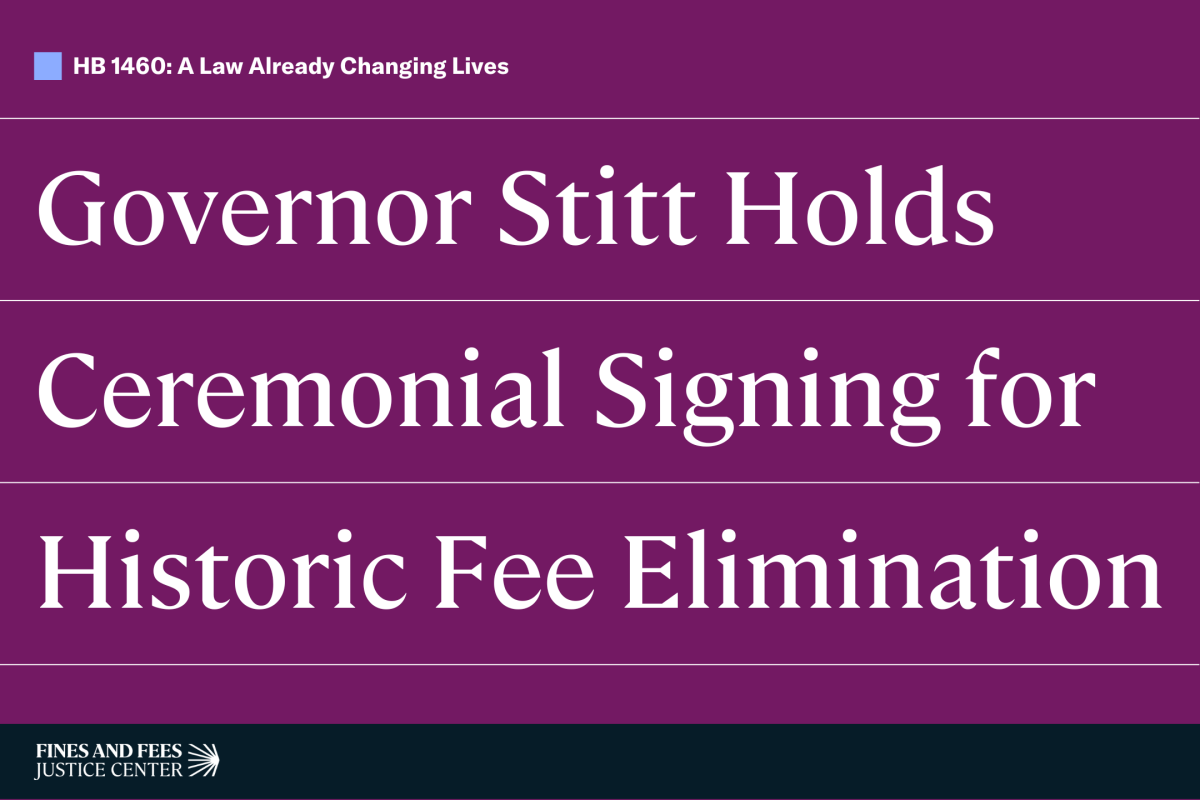The broadest Republican-led fee elimination bill in history will improve the lives of millions of Oklahomans.
Contact:
Michael Paul Jackson, Fines and Fees Justice Center
OKLAHOMA CITY — Today, Governor Kevin Stitt hosted a ceremonial bill signing for HB 1460, the broadest Republican-led criminal justice fee elimination bill in U.S. history. The new law will eliminate several criminal justice fees that saddle Oklahomans with debts they’re unable to pay – hurting their families, communities, and even the state’s budget.
The bill, which went into law in May, is the result of a sweeping, bipartisan effort led by the End Justice Fees campaign, a growing reform movement powered by the Fines and Fees Justice Center to bring together directly impacted people, legislators, community members and advocates for one cause: to eliminate the unjust and unfair fees that stifle economic growth and harm families across the country.
“In Oklahoma, we believe a second chance should actually be a second chance,” Gov. Stitt said. “We’ve made huge strides by closing four prisons in our state and giving over 40,000 people the opportunity to start again. I’m excited to make that a reality for even more people by eliminating these unnecessary fees that keep people trapped in the system.”
Justice fees harm state budgets and communities. They are hidden taxes that governments charge people, often marginalized, at multiple points in their interaction with the criminal legal system – surcharges that get tacked onto nearly everything, including minor traffic tickets, constitutionally guaranteed public defenders, emergency medical care while in jail, court-ordered drug testing or monitoring, and often even the cost of the incarceration itself. These fees are designed solely to raise revenue for governments.
Those who can’t pay risk having their lives upended, facing drivers’ license suspension, arrest, and jail. Ironically, these fees fail to reliably garner revenue for states, since many people simply cannot afford to pay, creating an enduring cycle of debt that harms families and the state’s bottom line.
“Oklahoma’s HB 1460 is a milestone moment in the bipartisan, national End Justice Fees campaign,” Priya Sarathy Jones, Co-Executive Director of the Fines and Fees Justice Center said. “This bill is the product of years of hard-fought organizing and advocacy, courageous leadership from legislators, advocates and directly impacted people, as well as Governor Stitt’s unwavering commitment to our shared goal: ending criminal justice system fees once and for all.”
Specifics of the new law include:
- Allowing judges to waive the costs of prosecution applied to defendants
- Eliminating a fee of up to $300/month for electronic monitoring administered by the state’s Department of Corrections
- Eliminating a $40 nonrefundable application fee for defendants who, because they are living in poverty, are already requesting legal representation by the Oklahoma Indigent Defense System
- Repealing a handful of other fees — including the DPS Database fee, Revolving Fund fee, Drug Cleansing fee, and Drug Abuse Treatment and Education fee — which sought to extract revenue from people who didn’t have it to give to cover services that should be funded through general revenue
“When we refuse to remove these substantial barriers, we continue to punish people well after they’ve served their time,” Representative Tammy West said. “These measures will change the lives of Oklahomans and give those who may be struggling a helping hand to break generational cycles. Without the burden of overwhelming fees, people will be better equipped to rebuild their lives and become productive members of society.”
“The goal of our public safety system is to punish at the appropriate level and rehabilitate where possible,” Senator Todd Gollihare said. “Saddling those reentering the community with excessive fees before they’ve had a chance to find gainful employment is counterproductive.”
“Oklahoma continues to improve recidivism rates by recognizing that burdening individuals reentering the workforce with fees that are rarely recovered creates an unnecessary barrier to building a safer, smarter Oklahoma,” Secretary of Public Safety Tricia Everest said.
Oklahoma is just one of a growing number of states that are taking action against harmful fines and fees in the criminal legal system. For example:
- In 2022, Colorado ended drivers’ license suspensions for failure to pay.
- In 2023, Florida ended jail room and board fees in Miami-Dade County and expunged all related debt for those costs.
- That same year, Nevada passed SB 416, which eliminated medical co-pays and room and board fees for incarcerated people.
- Last year, Maryland ended parole supervision and drug testing fees in 2024 and Gov. Wes Moore forgave $13 million in outstanding fee debt.
- Early this year, Ohio passed HB29, making it the 26th state to end or significantly reduce debt-based drivers’ license restrictions; and
- In July of this year, New York ended the financial burden on the families of incarcerated people by making jail phone calls free.
The bipartisan movement to reform fines and fees highlights the groundswell among organizations across the political spectrum, with partners ranging from the ACLU, Americans for Prosperity, Responsible Business Initiative for Justice, Americans for Tax Reform, American Legislative Exchange Council, and many others.
Today’s bill “will go beyond having a positive impact on families and communities across Oklahoma,” Sarathy Jones said. “This is a message to states across the country: it’s time to end justice fees.”
